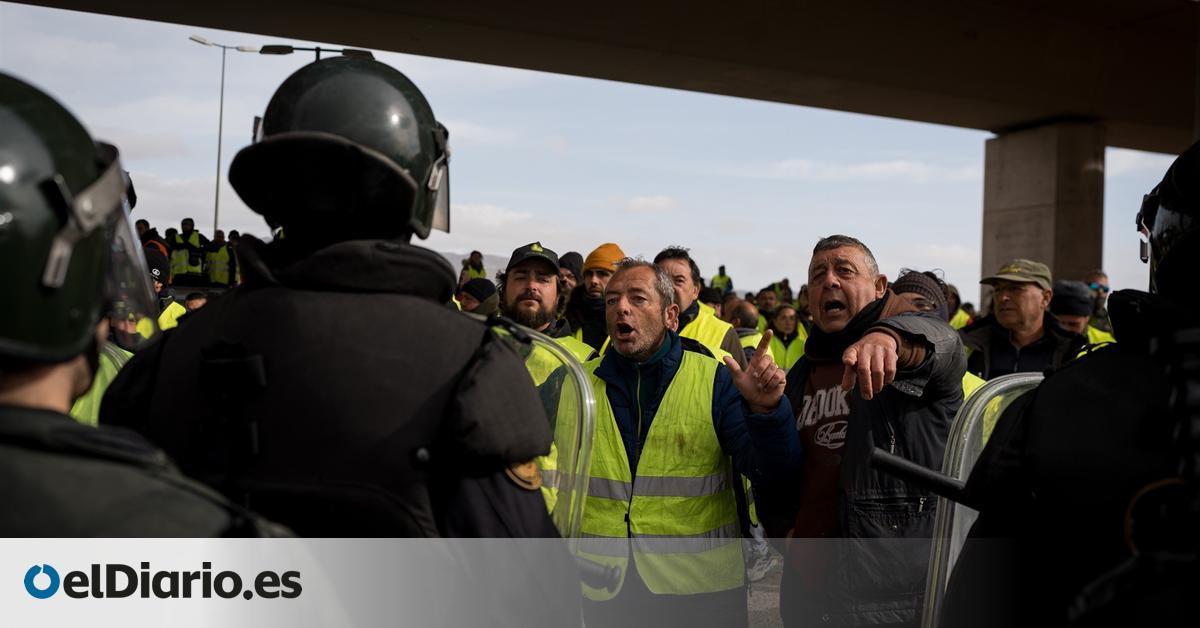
On the third day of protests by farmers and ranchers, the demonstrations have escalated. Hundreds of tractors and even people on foot have cut off – and still block – numerous roads throughout the country, where in some cases there have been charges by the security forces. In the south of Badajoz, a civil guard was injured by a stone while trying to avoid the blockage of the A-66 highway. “The Civil Guard has given the first blow and if they hit you, you defend yourself,” said Manuel Sánchez, a farmer from the Campiña Sur, according to reports. elDiario.es Extremadura.
This Thursday is the first day that the agricultural unions ASAJA, COAG and UPA officially called for protests, but since Monday there have been large mobilizations. According to Interior sources, as of this noon the Police have identified 2,725 people to propose administrative sanctions. These same sources indicate that there have been 19 detainees, 799 administrative complaints and 4,200 traffic complaints have been filed.
To put it in context, in the province of Cádiz alone, 434 complaints were processed against farmers in a single day, in addition to 11 sanction proposals for crimes against Road Safety. In Granada, a detainee has been brought to justice for the crime of attacking authority and has already been provisionally released.

In the Valencian Community there have also been hundreds of fines – “both traffic and public safety” – and one detainee at the A-3 cut in Utiel (Valencia) on Wednesday, as announced by the Government delegate in the region , Pilar Bernabé.
Three were arrested this Thursday in León, where the tractors left at dawn to cut several roads. Currently, there are reported protests on four national highways in the province: León-Astorga, the N-630 and the N-625 that connect with Asturias and Valladolid. In Burgos, the Civil Guard has arrested two farmers for attacking authority, disturbing public order and serious disobedience on the A-1 highway near Rubena in a picket formed by about 200 people.
In Logroño, hundreds of farmers and ranchers have taken the center, in a protest whose participants have described as “historic.” There have been moments of confrontation with the Police and some protesters have tried to enter – without success – the Government Delegation, where the protest has culminated in an unpleasant scene: the protesters have placed a dead sheep in front of the headquarters.

Tension has also escalated in Asturias, where there have been fights between the Police and ranchers who were trying to access the street of the Presidency headquarters in Oviedo. Two columns of tractors arrived in the Asturian capital at mid-morning cheered by hundreds of citizens who were waiting for them on foot. As they headed towards the Presidency headquarters, the riot police blocked their way.
The protests have gone further in Navarra, where early this morning a dozen tractors tried to reach the family home of the regional president, María Chivite. The police device has prevented more tractors from going to the house in Gorraiz, and from there they have headed towards the highway towards Pamplona.
In another capital, Ciudad Real, the image of the day was a tanker truck spilling more than 25,000 liters of French wine in front of the headquarters of the Guadiana Hydrographic Confederation.

In Euskadi, farmers have gathered in front of the headquarters of the Basque Parliament, taking advantage of the fact that the law for ecological transition and against climate change was being approved, in addition to measures for “generational change” in the countryside. “We are coming out with a lot of strength. People don’t want to stop. The situation in the countryside is complicated,” said Julen Martínez de Santos, a rancher from the town of Kuartango in Álava who acted as spokesman for the early protest, according to his colleagues. elDiario.es Euskadi.
The Basque rancher attributed the causes of the conflict to the “2030 agenda” and regretted that the Ertzaintza treats them “like criminals.” In front of Parliament there have been some charges with batons and shields to move the protest line a few meters away and allow political representatives to enter the Chamber.

Traffic cuts in at least six communities
According to the General Directorate of Traffic (DGT), after three in the afternoon, dozens of roads in at least six autonomous communities were still affected. In Extremadura, the A-66 at Pradochano, the N-432 and the N-435 have traffic interrupted; in Castilla-La Mancha, the A-30 and A-31 (Albacete) and the A-3 (Cuenca) continue with retentions; in Castilla y León, the N-627, N-611 and N-122 continue to be affected; in
Aragon, traffic on the A-2 and A-68 (Zaragoza) continues to be irregular; in Andalusia, the A-406 and A-451 remain blocked; and in the Valencian Community, the N-3 near San Antonio is closed in both directions.
⚫️🚜Agricultural mobilizations persist.
Estremadura:
➡️Badajoz
-EX-214 Ship of Santiago
-EX-105 Valverde de Leganés and Almendral
-N-432 Tower of Miguel Sesmero
-N-435 Almond➡️Cáceres
-A-66 Pradochano
-EX-109 Moral
-EX-A1 Houses of Don Gonzalo and Plasencia
-EX-108 Leather pic.twitter.com/bD3kFp3X0s— General Traffic Director (@DGTes) February 8, 2024
The Government tries to calm tempers
Faced with the tractor units, barricades and pickets that threaten to continue, the central government is trying to make a move. This Wednesday, President Pedro Sánchez committed to “strengthen the Food Chain Law” to prevent farmers and ranchers from selling for less money than it costs them to produce, while advocating for simplifying the Common Agricultural Policy (CAP). and establish mirror clauses in international trade agreements.
For her part, the Minister of Inclusion, Social Security and Migration, Elma Saiz, has called on agricultural organizations next Tuesday, February 13, to address the “labor problem” in the countryside. The minister has estimated that 100,000 jobs have been lost in this sector in 10 years. Also next week, the Food Chain Observatory is scheduled to meet, the collegiate body attached to the Ministry of Agriculture, Fisheries and Food aimed at achieving a good balance between the links in the chain.
Source: www.eldiario.es

